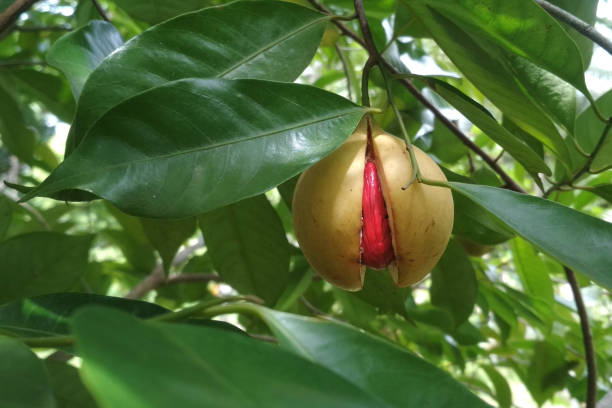Nutmeg, the fragrant spice harvested from the seeds of the Myristica fragrans tree, has long been a staple in kitchens worldwide. Its warm, earthy aroma and rich, slightly sweet flavor have earned it a cherished place in countless recipes, from classic holiday eggnog to exotic curries. However, the history and uses of nutmeg extend far beyond its culinary applications.
A Journey Through Nutmeg’s Origins
Nutmeg’s story begins in the lush tropical regions of Indonesia, where the Myristica fragrans tree, native to the Banda Islands, thrives. These remote islands, often referred to as the “Spice Islands,” were once the epicenter of the global spice trade during the Age of Exploration. Europeans, including the Portuguese and Dutch, embarked on perilous voyages to secure access to these valuable spices, with nutmeg being one of the most sought-after treasures.
The Myristica fragrans tree produces two distinct spices: nutmeg and mace. Nutmeg is the inner seed of the fruit, while mace is the vibrant red aril that surrounds the seed. Both spices have unique flavor profiles and culinary uses, making the tree doubly valuable.
Culinary Magic of Nutmeg
Nutmeg’s warm and aromatic flavor profile makes it a versatile and beloved ingredient in a wide range of dishes. It is a key component in classic recipes like pumpkin pie, apple pie, and mulled wine. A pinch of freshly grated nutmeg can elevate the flavor of creamy sauces, soups, and custards, adding depth and complexity to the culinary experience.
In savory dishes, nutmeg plays an essential role in enhancing the flavor of creamed spinach, béchamel sauce, and various pasta dishes. Its ability to bridge the gap between sweet and savory makes it a favorite spice among chefs and home cooks alike.

Nutmeg’s Medicinal History
Beyond its role as a culinary delight, nutmeg has a rich history of medicinal uses. Traditional herbalists and healers have employed nutmeg for centuries to address a variety of ailments. Its potential health benefits include:
- Digestive Aid: Nutmeg is believed to aid digestion by promoting the secretion of digestive enzymes. It has been used to alleviate symptoms like indigestion and bloating.
- Pain Relief: Nutmeg oil, extracted from the seeds, contains compounds like myristicin and eugenol, which have analgesic properties. It has been used topically to relieve muscle aches and joint pain.
- Mental Health: In traditional medicine, nutmeg has been associated with improved mood and reduced stress. However, it’s crucial to use nutmeg in moderation, as excessive consumption can lead to hallucinations and other adverse effects.
- Oral Health: Nutmeg oil has been included in some dental products due to its potential antibacterial properties, which can help combat oral infections and bad breath.
It’s important to note that while nutmeg does offer potential health benefits, excessive consumption can be harmful. Consuming large quantities of nutmeg can lead to adverse effects, including hallucinations, nausea, and even toxicity, so moderation is key.
Nutmeg in Modern Times
In the modern era, nutmeg continues to be a popular spice in both traditional and contemporary cuisine. Its unique flavor profile and aromatic qualities have made it a staple in the spice racks of home cooks and professional chefs alike.
Moreover, nutmeg’s global cultivation has expanded beyond its Indonesian origins. Today, it is grown in various tropical regions, including the Caribbean, India, and Sri Lanka. This widespread cultivation ensures a steady supply of this beloved spice to markets worldwide.
Nutmeg’s journey from the Spice Islands to our kitchens is a testament to its enduring popularity and versatility. Whether used to infuse flavor into holiday dishes, provide comfort through its medicinal properties, or explore new culinary horizons, nutmeg remains an integral part of our culinary and cultural heritage. As you reach for this humble spice in your pantry, take a moment to appreciate the rich history and diverse uses that make nutmeg a true marvel in the world of spices.


